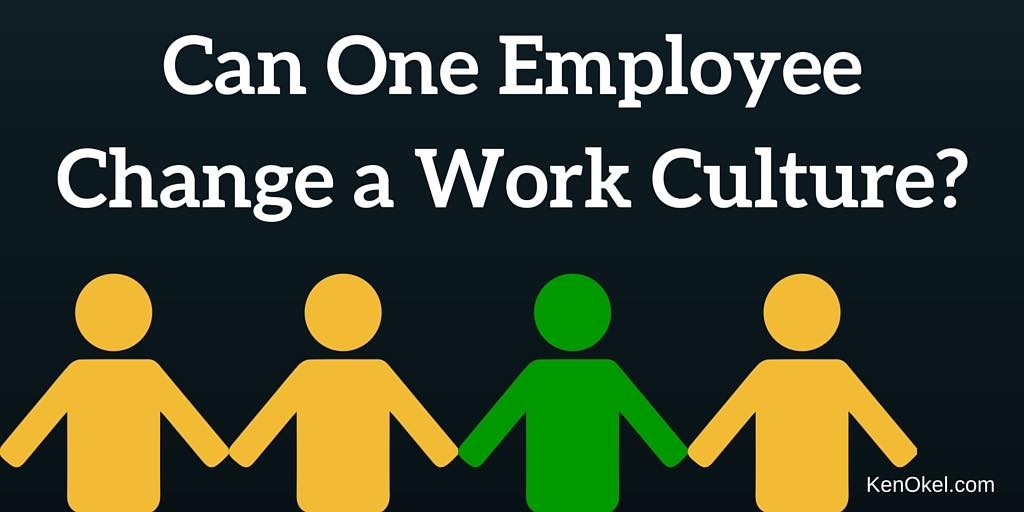 When employees are asked what they don’t like about their jobs, a common complaint is their work culture. This is different from an organization’s mission statement or vision.
When employees are asked what they don’t like about their jobs, a common complaint is their work culture. This is different from an organization’s mission statement or vision.
A work culture is about what it’s like to be an employee at a business. It’s how you feel about returning to your job on a Sunday night or how excited you are to be leaving it on a Friday night.
Often, the state of a work culture is thought of as a senior management responsibility. While this should be a top concern, your leaders may not have enough of an idea of what life is like for the average worker. Plus, their interactions with subordinates may see everyone on his or her best behavior, giving an inaccurate perspective.
While, you may feel powerless to change your work culture, that’s not the case. Being an agent of positive change does not require power or authority over others.
It does need you to set high standard and lead by example. This strategy can be surprisingly powerful as I introduce you to Janet the Janitor.
There was no way that I could avoid meeting Janet the Janitor. She was standing in front of a glass door that I needed to go through.
Janet was totally focused on the glass, as she stood ready with a bottle of cleaner.
To my eyes, the door looked spotless. I didn’t want to scare Janet, so I shuffled my feet to alert her of my presence.
Eventually, she turned around at the sound, smiled, and moved to the side.
“I’m sorry,” Janet said, “I was looking for smudges.”
It was then that I realized that Janet approaches her job differently than most janitors. From talking to her and others in the office, her philosophy is all about making sure that things never get dirty. Many janitors are concerned with just cleaning up that day’s mess.
Janet was the latest in a series of janitors who had worked at this office. Her predecessors were forgettable as they emptied trash cans or cleaned certain areas when requested. They’d usually be on the job for less than six months before they would leave.
Janet changed the game from day one. She cleaned everywhere and would anticipate potential problems.
For instance, a staff lunch would likely produce more garbage and require more cleanup time. Janet would be ready, the mess would be cleaned up, and there would be no unattended, overflowing trash cans.
As a result, Janet has more job security than almost anyone else in the organization. Her impact goes beyond that.
Employees in the business have noticed the change in the office’s appearance. They’ve started to act cleaner. When you see someone putting forth such effort to keep things clean, you don’t want to be the one who leaves paper on the floor near the copy machine.
It’s a running joke in the conference room, where everyone now uses coasters on the table, so Janet won’t have to clean up a water mark from a glass.
“She’s the best janitor we’ve ever had and we need to make sure she stays with us,” said one manager. “While we’ve given her bonuses, we know that she gains the most satisfaction from our spotless office. Who would want to go against that’ It’s like she”s always looking over your shoulder”
A woman with a spray bottle changed a work culture. Maybe cleanliness isn’t something that will change your career but working in a messy place is a condition you’ll face constantly.
Consider the role you can play in improving your work culture. Your actions may go unnoticed but that doesn’t mean they shouldn’t be pursued.
A positive work environment is priceless and you can play a role in its creation.






